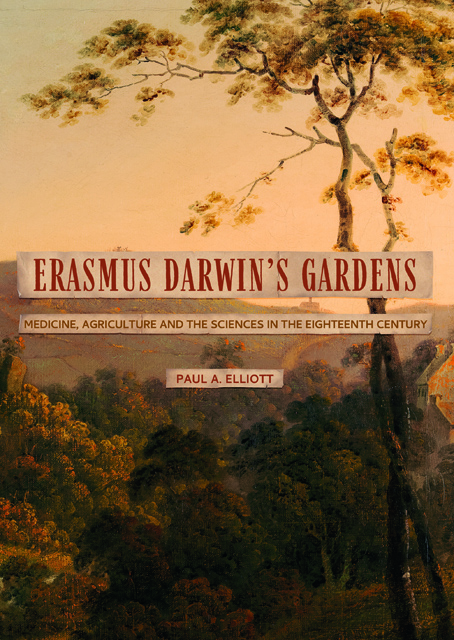Book contents
- Frontmatter
- Contents
- List of Figures
- Acknowledgements
- A Note on Plant Names and Identification
- Introduction
- 1 Lichfield and Derby Gardens
- 2 Medicinal Plants and Their Places
- 3 Agricultural Improvement: Enclosure and the Application of Science and Technology
- 4 Vegetable Physiology, Technology and Agriculture
- 5 Vegetable Pathology and Medicine
- 6 Among the Animals
- 7 Animal Diseases
- 8 ‘Eating of the Tree of Knowledge’: Forestry, Arboriculture and Medicine
- 9 Trees in the Economy Of Nature
- Conclusion
- Select Bibliography
- Index
- Garden and Landscape History
- Frontmatter
- Contents
- List of Figures
- Acknowledgements
- A Note on Plant Names and Identification
- Introduction
- 1 Lichfield and Derby Gardens
- 2 Medicinal Plants and Their Places
- 3 Agricultural Improvement: Enclosure and the Application of Science and Technology
- 4 Vegetable Physiology, Technology and Agriculture
- 5 Vegetable Pathology and Medicine
- 6 Among the Animals
- 7 Animal Diseases
- 8 ‘Eating of the Tree of Knowledge’: Forestry, Arboriculture and Medicine
- 9 Trees in the Economy Of Nature
- Conclusion
- Select Bibliography
- Index
- Garden and Landscape History
Summary
The physician Dr Erasmus Darwin (1731–1802) (Figure 1) is still most well known as Charles Darwin’s grandfather, a major evolutionary thinker and a natural philosopher whose ideas partly prefigured those of his grandson. A genuine larger-than-life character of robust physical size and generous but sometimes sarcastic humour, whose medical practice took him travelling around the midland counties for decades, Erasmus Darwin obtained fame in his own lifetime as the author of The Botanic Garden (1791), an epic poem with lengthy philosophical notes published in two parts, The Loves of the Plants (1789), which amused Georgian society with its poetic portrayal of vegetable amours, and the longer Economy of Vegetation (1791). Darwin also published Zoonomia (1794/96), a major study of human physiology and medicine, The Temple of Nature (1803), a grand epic poetical celebration of the wonders of life with philosophical notes, and Phytologia (1800), on the philosophy of agriculture and gardening. He came from Nottinghamshire but spent most of his life in Lichfield, Staffordshire and Derby.
Darwin grew up on the low-lying family estate in Elston in east Nottinghamshire, close to the river Trent and its tributaries (Figure 2). The family were gentry who also owned land in other parts of the county and in Lincolnshire, some of which Darwin inherited on his marriage to his first wife Mary Howard (1740–1770) in 1757. His father Robert (1682–1754), a lawyer, and his mother Elizabeth (Hill) (1702–97) had six other children: Elizabeth (1725–1800), Anne (1727–1813), Susannah (1729–1789), William Alvey (1726–1783), John (1730–1805), rector of Elston, and Robert Waring (1724–1816), a lawyer and botanist who inherited Elston Hall (Figure 3). Darwin attended Chesterfield school, Derbyshire, when it had a strong reputation under William Burrow (1683–1758), which conjured up memories of ‘a thousand pleasing circumstances’ and where his classmates included the antiquarian Rev. Samuel Pegge (1733–1800) and Lord George Cavendish (1728–94), second son of William Cavendish, 3rd duke of Devonshire.
After receiving a medical education at St John’s College, Cambridge, and Edinburgh University during the 1750s and unsuccessfully trying to practise at Nottingham in 1756, Darwin quickly built up a reputation and income as a physician at Lichfield and Derby, travelling around the midland counties tending to patients and thriving in the highly competitive, burgeoning medical marketplace of Georgian England (Figure 4).
- Type
- Chapter
- Information
- Erasmus Darwin's GardensMedicine, Agriculture and the Sciences in the Eighteenth Century, pp. 1 - 18Publisher: Boydell & BrewerPrint publication year: 2021



